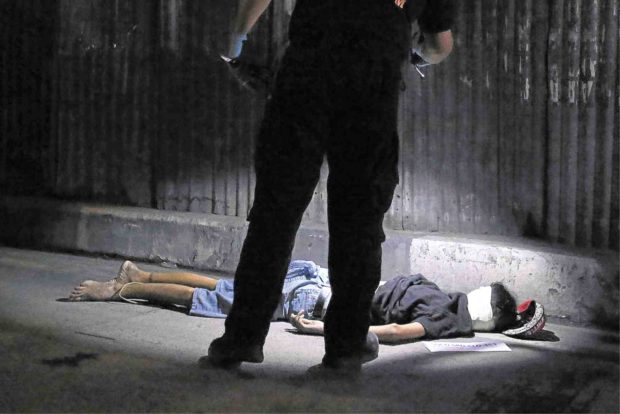
Human rights advocates who see the drug war as President Rodrigo Duterte’s chief instrument of control see no end to scenes like this. (File photo by RAFFY LERMA / Philippine Daily Inquirer)
MANILA, Philippines — What happens next if the International Criminal Court (ICC) approves the probe of the crimes against humanity case filed against President Rodrigo Duterte?
Though the request for judicial authorization was filed by Prosecutor Fatou Bensouda, the case would be handled by Karim Asad Ahmad Khan, who took over her post on Wednesday. And he should expect to be involved in a long process.
“So the judges would make a decision, in around three months […] in terms of what that r, what the next steps look like, I mean this is not a quick process, especially since it will be taking place primarily from the outside,” Param-Preet Singh, associated director of the International Justice Program of Human Rights Watch (HRW) said in a press briefing on Wednesday.
“It’s this painstaking process — sometimes tedious — of gathering evidence to prove the elements of the crime that they think have been committed […] And so, you know it would likely be a slow process to again build the cases,” she added.
According to Singh, the investigation — if it proceeds — could become a tool to pressure the Philippine government into cooperating with the body.
She cited the example of former Sudanese President Omar al-Bashir, who faced similar crimes against humanity charges before the ICC.
Though Sudan didn’t hand over al-Bashir at first, he was jailed after his government was overthrown — and he is still is in jail pending trial.
“Eventually arrest warrants will be issued, whether or not the Philippines’ government would comply. Safe to assume they probably won’t. But then it becomes, you know, a situation of building political pressure to force the government’s hand to comply,” Singh said.
“And what [does] that look like? I mean we have other examples from other countries, situations to draw from, but you know, look at Sudan. When the former prosecutor issued an arrest warrant against Omar al-Bashir, no one thought that it would ever be [served], it felt like a fool’s errand. And then here we are, so many years later, you know there is a very real possibility that he will face justice,” she added.
Last Monday, Bensouda revealed that she had already sought judicial authorization to proceed with a probe into the crime against humanity complaint filed against Duterte in connection with his bloody drug war.
The complaint against Duterte was drawn up by the Rise Up for Life and Rights, a group of drug war victims’ relatives and rights advocates. The group accused Duterte of violating Article 7 of the Rome Statute for “widespread and systematic attacks in the form of murder of thousands of civilians” his administration’s implementation of the campaign against illegal drugs.
The Rome Statute is the treaty that established the ICC. The Philippines withdrew from the ICC in March 2018, and administration officials have since insisted that the body no longer had jurisdiction over the country.
Still, Bensouda maintained — and was supported by rights advocates — that ICC still had jurisdiction over the complaint as the alleged crimes happened before the Philippines withdrew its membership.
The Duterte administration has consistently maintained that there were no irregularities, including extrajudicial killings, in the conduct of the drug war. In one televised press briefing, Duterte blamed the killings that took place outside of legitimate on warring drug syndicates.
RELATED STORIES
ICC prosecutor asks for judicial authority to probe case filed vs Duterte
Palace: Duterte will never cooperate with ICC probe
‘Discreet’ probe shows warring drug gangs behind EJKs – President

